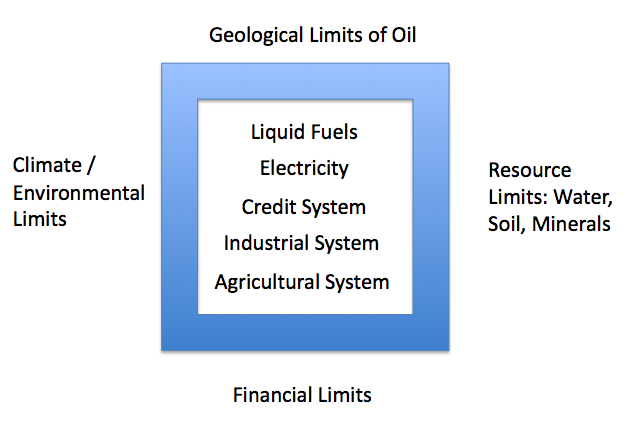Re: Top 10 oil fields (Cantarell kaput)
Yes, that makes me so sad. We should have done something about it slowly over the years so that we did not become so dependent on imported energy. We squandered what resources we had, and then we just couldn't be bothered to up fuel efficiency, insulate houses, work on public transportation that takes decades to put in place, and not let the sprawl become ridiculous.
We put the solar water heaters up in the 80s after the horrible oil shocks and inflation of the 70s, and they have been working these 30 years... a neighbor has the same solar water heater, and theirs is still working after 40 years. New evacuated tube models have solved the freezing problem, but I would research carefully and go with long established companies to increase likelihood of a long service life. There are many details of construction that matter, particularly trying to keep different types of metal from contacting each other because whenever they get wet, it sets up a galvanic charge (like a very weak battery) that makes the metal corrode faster. The 80s is when I started keeping developments in the back of my mind so that I could adopt at the right time when the technology had matured and the price had come down.
Solar water heaters matured many years ago.
Elastomeric roofs matured and had a lot of testing data in the last decade, so adopted that in 2005.
Photovoltaics are maturing now, so it will be good in sunny areas to adopt in the next few years.
LEDs are maturing now (but some are still really terrible, so look at a display where you can actually see them in operation), so try one out and learn all the issues of light color, lumen output, service life, etc. Even though they are expensive, the cost should drop to about $10 in the next couple of years. Over 10 years, an incandescent will use about $1,000 of electricity, whereas an LED will use about $100 (that would be $900 in your pocket; about $1,800 you did not have to earn and pay taxes on in order to have the $900). You only need to replace the lights you leave on all the time; the other lights don't matter much. I have a 7 watt Toshiba LED bulb (not yet available in the US) over my kitchen sink, and the light is warm and bright. When I find one that I like in the US, I am going to buy a case of them for the next family party and give everyone a bulb so that they can see what they are like.
One of things I try to do is make the house a kind of demonstration model. Friends and neighbors see it and then start to do the same, so in the end, a fairly small outlay on my part is multiplied and ripples outward.
Energy use for TVs is about to drop with improvements in LED backlighting or with ultimate transition to individually addressable microLEDs. Then will trash the cathode ray tube TV we have.
Panasonic-Sanyo seem to be working on a battery unit about the size of a small refrigerator for residential use that will store about one week's worth of electricity. When that matures, I will get one and go offgrid using the photovoltaics.
Saving up the cash and waiting for a technology to mature and drop in price to a reasonable level makes all the difference, and if get the timing right, the cost is zero... no, you actually make money doing nothing by plugging another one of the holes in the bottom of the tub through which money is dribbling away...
Originally posted by Shakespear
View Post
We put the solar water heaters up in the 80s after the horrible oil shocks and inflation of the 70s, and they have been working these 30 years... a neighbor has the same solar water heater, and theirs is still working after 40 years. New evacuated tube models have solved the freezing problem, but I would research carefully and go with long established companies to increase likelihood of a long service life. There are many details of construction that matter, particularly trying to keep different types of metal from contacting each other because whenever they get wet, it sets up a galvanic charge (like a very weak battery) that makes the metal corrode faster. The 80s is when I started keeping developments in the back of my mind so that I could adopt at the right time when the technology had matured and the price had come down.
Solar water heaters matured many years ago.
Elastomeric roofs matured and had a lot of testing data in the last decade, so adopted that in 2005.
Photovoltaics are maturing now, so it will be good in sunny areas to adopt in the next few years.
LEDs are maturing now (but some are still really terrible, so look at a display where you can actually see them in operation), so try one out and learn all the issues of light color, lumen output, service life, etc. Even though they are expensive, the cost should drop to about $10 in the next couple of years. Over 10 years, an incandescent will use about $1,000 of electricity, whereas an LED will use about $100 (that would be $900 in your pocket; about $1,800 you did not have to earn and pay taxes on in order to have the $900). You only need to replace the lights you leave on all the time; the other lights don't matter much. I have a 7 watt Toshiba LED bulb (not yet available in the US) over my kitchen sink, and the light is warm and bright. When I find one that I like in the US, I am going to buy a case of them for the next family party and give everyone a bulb so that they can see what they are like.
One of things I try to do is make the house a kind of demonstration model. Friends and neighbors see it and then start to do the same, so in the end, a fairly small outlay on my part is multiplied and ripples outward.
Energy use for TVs is about to drop with improvements in LED backlighting or with ultimate transition to individually addressable microLEDs. Then will trash the cathode ray tube TV we have.
Panasonic-Sanyo seem to be working on a battery unit about the size of a small refrigerator for residential use that will store about one week's worth of electricity. When that matures, I will get one and go offgrid using the photovoltaics.
Saving up the cash and waiting for a technology to mature and drop in price to a reasonable level makes all the difference, and if get the timing right, the cost is zero... no, you actually make money doing nothing by plugging another one of the holes in the bottom of the tub through which money is dribbling away...
 ].
]. 






Comment